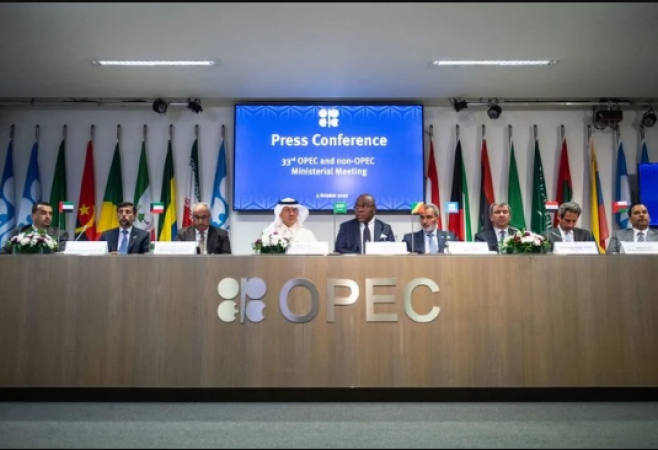
RIYADH: The world would have suffered if the Organization of the Petroleum Exporting Countries and its allies had delayed their decision to cut production, according to a statement by Saudi Arabia's foreign ministry.
The OPEC Plus group set to reduce supplies by 2 million barrels per day on October 5.
Saudi-US relations will have consequences, with US President Joe Biden calling the decision "short-sighted" and promising that "there will be consequences" without specifying what his administration plans to do. US President Biden is trying to stop Russia from profiting from energy sales to stop Russia's war in Ukraine.
Also read: UK Prime Minister Liz Truss fires Finance Minister and reverses tax cuts
In response, the Saudi Foreign Ministry said claims that the Kingdom was supporting cuts against the US for political reasons or favoring a side in international disputes were unfounded and removed the OPEC+ decision from its economic context. Gave.
According to the statement, "The state clarified through ongoing consultations with the US Administration that all economic analysis indicates that postponing the OPEC+ decision by a month, as suggested, will result in negative economic growth." There will be consequences." In response to OPEC+'s decision to cut oil supplies last week, the Kingdom also shrugged off its criticisms.
According to the ministry statement, the OPEC+ agreement was unanimous and aimed to balance supply and demand to help reduce market volatility. Saudi Arabia rejected any attempt to deviate from the agreement's primary objective of protecting the global economy from changes in the oil market.
In an interview with CNN, Saudi Arabia's Minister of State for Foreign Affairs Adel al-Jubeir declared in a reassuring tone: "Saudi Arabia does not politicize oil. Oil is not seen by us as a weapon. We treat oil as a commodity. We aim to make the oil market more stable. And our record on this is very clear, not only over the past few weeks, but over the course of decades.
He said the United States and Saudi Arabia have "enduring" interests in fighting terrorism and extremism, as well as the implications of the dispute on their relationship.
We have about 80,000 Americans living and working in Saudi Arabia, and we have a very strong relationship in terms of trade and investment, he continued, so I don't think this relationship is far from it.
Saudi Arabia's Energy Minister Prince Abdulaziz bin Salman also spoke on the radio, telling Bloomberg that "our current priority is market stability in terms of demand and investment."
Also read: Exports rise to USD35.45 bn in Sept; trade deficit widens to USD25.71 bn
“That mantra might be acceptable if it means that we are doing this intentionally to drive up prices and it is not on our radar, our radar is to make sure we keep the markets,” he questioned. said in response to. Take profit first.
According to the unnamed official quoted in the Saudi Foreign Ministry statement, "resolving economic challenges requires the establishment of a non-political constructive dialogue, as well as intelligently and rationally considering what will serve the interests of all countries." The Kingdom declares that it views its relations with the United States as strategic and advances the interests of both countries.
According to Abdulaziz Al-Moqbel, a consultant and expert, the situation in the US is "directly influenced by the state of the refining sector in the US," which is characterized by aging refineries and a lack of diversified sources of heavy and medium crude benchmarks. Energy Markets, who spoke to Arab News.
The trade war between the world's two largest economies, a pandemic, and, last but not least, the conflict in Ukraine have had negative effects on the world economy, he continued.
“Any disruption in the oil markets could lead to another economic crisis. The OPEC+ decision aims to be proactive and preventive to mitigate any negative impact of another crisis in the world economy.
Nayef Falah Al Hajraf, Secretary General of the Gulf Cooperation Council, supported Saudi Arabia.
Al Hajraf expressed "absolute solidarity" with the Kingdom, according to a statement posted on its website, adding that statements criticizing Saudi Arabia "lacked facts".
They praised the "important and important role played by the state at the regional and international level in the field of mutual respect between countries", as well as "the state's commitment not to compromise on the sovereignty of states, to safeguard the global economy". continued the commitment to fluctuating energy prices, and ensuring its supply in accordance with a balanced policy that takes into account the interests of producing and consuming countries."
Ahead of the November elections, US Democrats have attacked Saudi Arabia in light of the effects of rising gas prices, with some even calling for an end to the two countries' long-standing defense cooperation.
On Wednesday, the national average for gasoline was $3.92 per gallon. Mike Pompeo, a former US secretary of state, attributed the current energy crisis to Biden. "American policy has failed in this situation. Joe Biden bears primary responsibility for where the world stands in terms of energy. The progressive left, he continued, has spent 25 years believing that it can "rule the world on sunshine and windmills."
Also read: Digitisation helps in sustaining economic growth: FM Sitharaman
Apart from not erecting new refineries, Pompeo claimed that the current administration's approach to achieving US energy independence is flawed. "We closed a pipeline, made it difficult to obtain a permit, and implemented ESG regulations that now limit the ability to supply American consumers with energy extracted from American soil."
In the US, we have the ability to help ourselves, Pompeo said on Fox News on Sunday. When America has the ability to produce energy independence for its own country and, frankly, provide energy for the rest of the world as well, criticising OPEC or the Saudis would be a huge mistake.